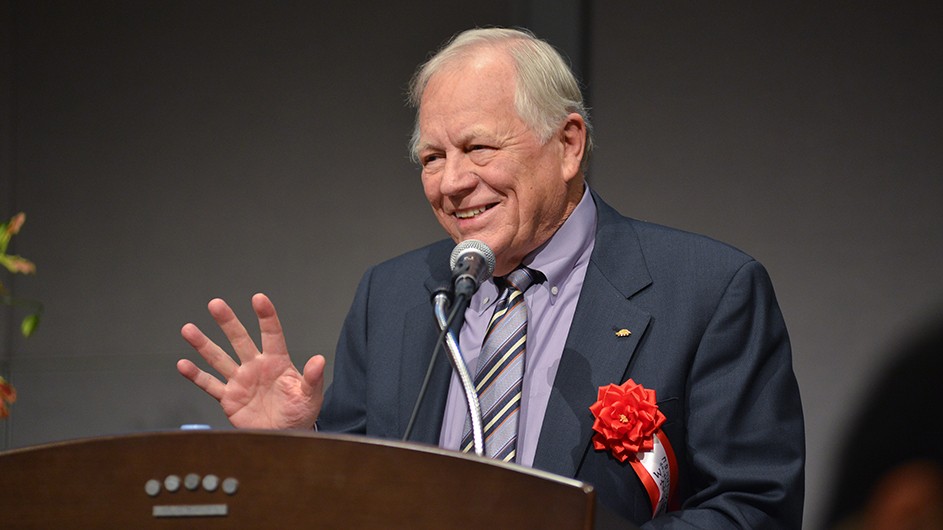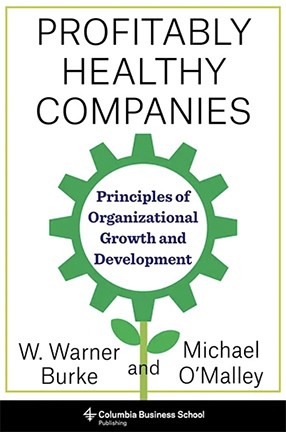How Do You Build a Lasting Business?
According to Professor W. Warner Burke, the answer means knowing that the fundamentals of psychology are relevant to organizational development.

Every company faces challenges, but some are able to achieve long-term vitality while others flame out. What distinguishes a healthy, high-performing organization? Which ingredients, decisions, and values result in a business that is built for the long haul?
Profitably Healthy Companies by W. Warner Burke, a professor of psychology and education at Teachers College, and Michael O’Malley, a lecturer at the Yale School of Medicine, lays out 10 essential principles of organizational development for sustained success. Bringing together practical and academic expertise, Burke and O’Malley explain the keys to company resilience, examining safeguards against decline and disaster, as well as tools for generative renewal and growth. They show how organizational culture encourages optimal performance, flexible and adaptive corporate strategy, and employee motivation and commitment.
Burke discusses the book with Columbia News, as well as why Daniel Kahneman and Yuval Noah Harari, whose books he highly recommends, would make brilliant dinner companions—along with the Bard.
Q. How did this book come about?
A. It was my coauthor Michael O’Malley’s idea, which, in broad terms, was to explain some of the fundamentals of psychology that are most relevant for understanding and developing organizations. Defining motivation and leadership are prime examples. And then it is a matter of getting motivation right by concentrating on what affects motivation—for example, finding the right person for the right job and role, not attempting to focus on motivation per se. Motivation is a consequence or outcome, not a process. Even though both selection and development are critical for effective leadership, selection is more important.

Q. Why is a focus on employee and community well-being more likely to ensure lasting profitability than focusing on the bottom line?
A. For two reasons: (1) Again, it is a matter of process compared with outcome. The focus should be on what directly affects the bottom line rather than the bottom line itself, such as innovation, job autonomy, collaborative behavior, and agility, along with a reward system that reinforces these actions. (2) To have a single-minded focus on the bottom line oversimplifies the complexity of organizational behavior and what causes what.
Q. In terms of current issues in the workplace, what are your recommendations for how to best center diversity and inclusion, and what are your thoughts on the promises and pitfalls of remote work?
A. First, regarding diversity and inclusion, here is what not to do! Do not appoint a vice president for diversity. This action will relieve all managers in the organization of any responsibility for selecting and developing a diverse workforce because "the VP for diversity will take care of all that stuff." Diversity and inclusion should be a part of every manager's responsibility.
Second, remote work: Early data indicate that remote work is correlated with higher productivity. Uninterrupted work and the power of concentration seem to help. So does managing your own time. On the other hand, innovation as a result of interaction with others, plus teamwork, is likely to suffer. In this age of ever-increasing complexity, the lone inventor is more likely to be a result of a novelist's imagination than a product of reality.
Q. What are some books you've read recently that you would recommend, and why?
A. There are two authors primarily: Daniel Kahneman and his Thinking, Fast and Slow, and Yuval Noah Harari's Sapiens: A Brief History of Humankind, as well as his three additional books in this series (Homo Deus: A Brief History of Tomorrow, 21 Lessons for the 21st Century, and Sapiens: A Graphic History). Kahneman explains how we think about thinking, that is, according to two systems: (1) intuitive and fast, and (2) deliberative and slow, and which is better for what situations. And, incidentally, he explains superbly what an algorithm is.
Harari also defines an algorithm very well (think recipe). Even though Kahneman was awarded the Nobel Prize in Economic Science, he was originally educated in social psychology. Harari is a historian, and explains in Sapiens the origins of our species. I am now reading his second book, Homo Deus. He claims that we are destined as a species to be ruled by artificial intelligence, a frightening prospect. Biotech must be a strong antidote, he argues.
These two authors and supreme scholars have stimulated my thinking about thinking, and affected me emotionally more than any other books I have read—and that's saying a lot!
Q. What's next on your reading list?
A. Harari's other books and whatever else he may write in the future. Two additional books include a recent one on artificial intelligence, The Age of A.I. and Our Human Future by Henry Kissinger, Eric Schmidt, and Daniel Huttenlocher, and The Soul of America by Jon Meacham, my favorite American historian.
Q. What are you teaching this semester?
A. Organization Change: Theory and Practice, Loosely Coupled Systems, and Learning Agility.
Q. You are hosting a dinner party. Which three academics or scholars, dead or alive, would you invite and why?
A. As one might expect, both Kahneman and Harari, so I could ask them to elaborate on some of the points from their books. And William Shakespeare, so he could help me to maintain appropriate perspective on what Kahnman and Harari have written, and now have to say—all over a nice cabernet.